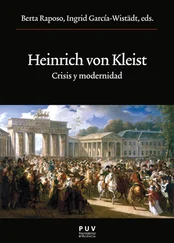Heinrich von Kleist
THE MARQUISE OF O—
Translated from the German
and introduced by Nicholas Jacobs
KLEIST’S STORIES
A formidable academic literature on Kleist’s stories exists in German and in English, detailed for example in Seán Allan’s The Stories of Heinrich von Kleist (Camden House, New York, 2001), strangely subtitled “ Fictions of Security ”. However, the universality of these tales calls also for a lay approach, no matter how much analysis and insight academic readings have yielded and will continue to yield.
Kleist’s stories are about the menace of freedom—its arbitrariness and potentially malignant anarchy. In The Foundling , in which an adopted orphan terrorizes his charitable adoptive parents, evil becomes natural, banal (Kleist was one of Kafka’s forebears). Neither Kleist nor Kafka ever sits in judgement over his characters, because to do so would imply that they have freedom of choice, when such freedom does not exist. Kleist’s characters develop from a natural inner compulsion and are always consistent. Their compulsive behaviour follows from their circumstances. They therefore cannot be judged, let alone found guilty. This sense of moral subjectivism and relativism came from Kleist’s reading of Kant. He never recovered from it. According to that reading—or misreading—there was no such thing as objective truth, he told his fiancée Wilhelmine von Zenge. That was Kleist’s personal coup de foudre and is a leitmotif of much of his work.
The magnetism of Kleist’s stories lies in the relation of their form to their content. The Duel , set in fourteenth-century Germany, is about the trial of a sexual crime by formal duel, through which truth was thought to be established, but is not. The story’s dense syntax suggests Early Medieval painting or tapestry, evoking claustrophobia and primitive perspective. In The Marquise of O — the obsessive, breathless syntax and tempo mimic the urgency and compulsion of the story.
Kleist’s stories are often characterized by a remorseless and bitter inconsequentiality, through which life can be switched in a half-sentence—in just a word—from ecstasy to horror (more rarely the reverse) up to the very last moment. This happens in one of his first stories, The Earthquake in Chile , where the horror of an earthquake is followed by an Edenic idyll of rescue and the happiness of restored love, returning to the horror of another restoration—brutal death by Catholic fanaticism.
Kleist’s stories are compulsive, inevitable and as unpredictable as reality. That the world is innately precarious ( gebrechlich ) is another leitmotif of his work. His suicide, or in German more fittingly his Freitod , and his words, written to his beloved half-sister Ulrike—“Die Wahrheit ist, daß mir auf Erden nicht zu helfen war” (“The truth is that here on earth there was no help for me”)—concluded his life with the resolve and intensity with which he had lived it.
Betrothal in Santo Domingo is a typical, horror-filled, skin-tight Kleist story set on the island of Haiti in 1804, when the black General Dessalines, brutal successor to the liberator Toussaint l’Ouverture, was preparing the massacre of the white population of the island, after Napoleon had reintroduced slavery after the Revolutionary Convention had ended it. Although the relations between black and white are at the heart of the events, Kleist’s interest is in the humanity of his characters. The colour of their skin plays an inevitable part in what happens, but their feelings as human beings always dominate; no one is reduced to a racial cipher. At the heart of the story is the betrothal between Gustav von der Ried, a young Swiss, and Toni, the mestiza daughter of a white Frenchman and the mulatto Babekan.
Attempting to save herself from her brutal stepfather, Toni pretends to have captured Gustav, ties him up with ropes, fleetingly “pressed a kiss on his lips” (a typical Kleistian touch), and believes she has saved them both from discovery. However, she has only signed her own death warrant, because at the earliest opportunity the apparently captive Gustav puts a bullet through her breast, before shooting himself on discovering his tragic mistake.
The longest Kleist story, at some hundred pages, and the only one with quasi-political overtones, is Michael Kohlhaas , set in mid-sixteenth-century Saxony. The last sentence of the story’s first paragraph foretells the action: “But his sense of justice made him a robber and a murderer.” The plot cannot be summarized because every detail is an essential ingredient in a tale that demands to be read as compulsively as it appears to have been written. Michael Kohlhaas exemplifies Kleist’s belief that justice becomes injustice when it condemns a man acting under the force of circumstance and inner compulsion.
THE MARQUISE OF O—
The Marquise of O —, the exception among the stories for its unconditionally happy ending, is an operatic drama with a historical background—the War of the Second Coalition (1798–1802) against Napoleon, when the united forces of Russia and Austria won back control of Northern Italy. Evocative in its ability to thrill, like Mozart’s Don Giovanni , it is a concerto of individual voices within a varied, sometimes discordant, but containing whole. Its emotional content is such that the nearer the solution, the nearer dissolution seems to be. The story concerns the mysterious pregnancy of a young aristocratic Italian widow and mother of impeccable repute during the Napoleonic Wars in Northern Italy. It is set down in the overflowing thoughts and words of its cast of five, whose consciousness and consciences are over-excited by the intensity of the circumstances in which they find themselves. There is a simultaneity of narrative by which the virtual interior monologue of each character combines to make a rich textual palimpsest. Repeated readings disclose ever more insights into the bearing and behaviour of the characters, each under their own stress—the Marquise, her mother, father, brother and “lover”. The story begins with and culminates in passion. At its core are two bursting hearts beating simultaneously against, and only at the very end with, each other. The story is mostly written in erlebte Rede —direct speech, on the edge of monologue intérieur , and also what might be called monologue extérieur : the Marquise drops her knitting when the idea occurs to her of inserting a newspaper announcement inviting the father of her child to make himself known.
RECEPTION OF THE MARQUISE OF O —
The Marquise of O —, completed in 1807, was first published in the Berlin journal Phöbus , edited by Kleist’s friend Adam Müller, in February 1808. When, in the course of the story, the Marquise, thinking about the illegitimate child she was to bear, feared it “would be scorned as a shameful stain on bourgeois society”, she anticipated very well the initial reception of the story. Adam Müller was criticized by an anonymous reviewer in 1808 as soon as it was published. The reviewer could not understand how a respectable editor could publish such a thing. “Just to summarize the story was to exclude such a work from respectable society. The Marquise is pregnant and doesn’t know how and by whom. Is this a subject deserving of a place in an artistic journal?” Dora Stock, famous for her silverpoint drawing of Mozart, thought that no woman could read it without blushing, and so frequently did the story meet with public prudery that Kleist responded with the following comic epigram, also published in Phöbus :
Читать дальше












